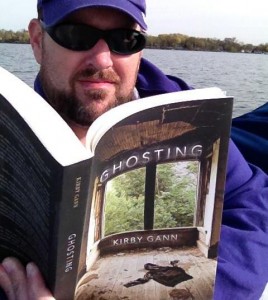Congratulations to my mentor, Kirby Gann, whose novel Ghosting has just been named a finalist for the Kentucky Literary Award. I first read it a week or two after publication, and I remember being up until 2am, unable to put it down for the last 100 pages. Ghosting, set in rural Kentucky, is about a young man, James Cole, who is haunted by the disappearance of his stepbrother. Most believe that his stepbrother, who’d worked as a drug runner, simply made off with one of the kingpin’s hauls and fled town. Cole doesn’t believe that his stepbrother would have left without leaving word for him; especially knowing that he himself has always hoped to escape this small community and its complex web of family histories, drug dealing, and addiction. Cole’s sense of loss and his yearning to understand, complicated by his own loss of direction and his mother’s painkiller addiction, wind up drawing him farther and farther into the underworld, in danger of forsaking his own destiny while following his stepbrother’s footsteps.
Ghosting is a tragedy of loss that doesn’t wallow; it’s a gritty look at the real horrors of drug addiction and commerce in rural America; and it’s a suspenseful coming-of-age thriller. What impresses me most about Ghosting is the depth and complexity of the characters, and Gann’s talent for exploring their psychologies from fresh angles. (This same talent is realized in his previous novel, Our Napoleon in Rags) Gann doesn’t allow his characters to be pigeonholed. The novel’s drug kingpin isn’t a stereotypical, flat, bad guy; we see how he became who he is, we witness his pains, jealousy, grief, desires, and personal eccentricities. Gann does not draw his characters from society’s medians and portray them along a fixed dimension, he discovers real people (whether mainstream or fringe) and boldly delves into their exceptional contradictions and fascinating eccentricities.

